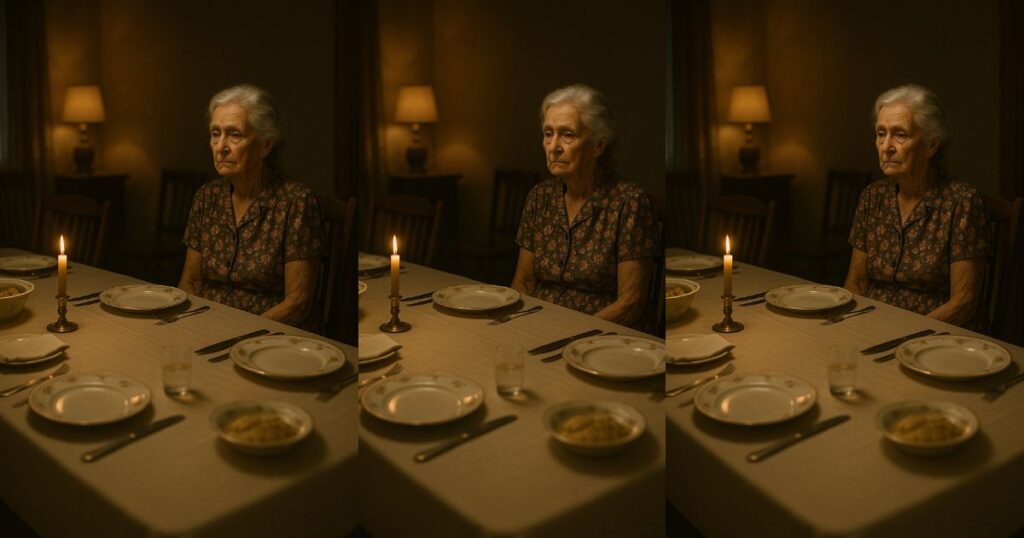Sometimes, the table fills back up before you even notice the chairs being pulled out again.
The little girl’s name was Ellie.
Her brother’s cast went from thigh to ankle, blue as the July sky, with signatures scrawled across it in crooked Sharpie. He limped up my porch steps three weeks later to return a mixing bowl and refused help even as his crutches clanked against the railing. That kind of pride—you don’t teach it. It’s born.
I invited them in. By then, I didn’t ask if folks were staying for supper. I just set the table for more.
At some point, word must’ve gotten out.
Maybe it was Ellie’s mama, who brought fresh cornbread one evening and stayed the whole meal talking about how hard it was raising two kids since her husband left. Or maybe it was my neighbor, Mr. Greene, whose wife had passed and who now brought his own chair on Tuesdays like clockwork, claiming, “Your meatloaf tastes like the ‘70s.”
I never put up a sign. Never posted anything. But somehow, five o’clock at my house became a thing.
A quiet ritual, passed hand to hand.
Retired mailmen. Divorced fathers. Single moms. A man who’d lost his job at the tire plant and just needed someone to ask if he wanted seconds.
And Luke—sweet, gawky Luke—kept coming. First with excuses (“I just wanted to check on you, Grandma”) and then without them. Sometimes he brought friends. They were polite, mostly. One girl had purple hair and brought a loaf of gluten-free banana bread that tasted like pencil erasers, but we all smiled and said thank you.
They didn’t know how to set the table. They didn’t always wait before eating. But I taught them, gently.
They listened.
One Thursday, I saw Luke linger after everyone left. He stood in the kitchen doorway, eyes on the counter, twisting a dish towel between his hands.
“I signed up for community college,” he said. “Night classes. EMT certification.”
I looked at him. At his posture, straighter now. At his face—still boyish, but stronger somehow. Something inside me swelled.
“That’s good,” I said, my voice rough. “That’s real good.”
He stepped closer.
“You remember that first night? With the chicken and dumplings?”
“I do.”
“I didn’t tell you, but… I was thinking of quitting school that week. I felt like nothing mattered. Like I was just floating.”
He paused. The silence between us felt thick, sacred.
“But something about that supper—about you, about the way you made it feel important—” he took a breath, “—it stuck with me. Made me want to be better.”
I reached out, and he took my hand. His fingers were bigger now. Warmer. Steadier.
“You are better,” I said.
We kept the five o’clock ritual going for a year. Through cold winters and broken heaters, through potlucks and soup nights and birthdays we hadn’t expected to matter anymore.
Until the last supper I cooked.
I didn’t know it would be my last. My legs were sore that day. Knees stiff. The roast burned a little on the edges, and I forgot to set the beans out until halfway through the meal. But no one complained.
They passed the rolls.
They said thank you.
They smiled with full mouths and full hearts.
Luke cleared the table afterward. Without being asked. Without a word.
And I sat in my chair, the one with the faded cushion and the loose screw, and watched the kitchen fill with life.
A month later, I moved in with my daughter in Des Moines. Smaller kitchen. Different smells. New routine.
But every Thursday at five, Luke hosts his own supper.
He sets the table with mismatched plates from the thrift store. He says the napkins never match and the chairs are wobbly. But people come. And they stay.
He tells me sometimes, over the phone, about the folks who drop by. About how one old man cried into his stew because it tasted like his wife’s cooking. About a high school girl who shows up early to learn how to make gravy. About how someone brought candles last week—cheap, unscented, but thoughtful—and it made the whole room feel holy.
He says, “I don’t know how it happened, Grandma.”
And I say, “I do.”
Because supper was never about the food.
It was about showing up. About making room. About holding space for one another in a world that’s always rushing past.
And some things—when served warm and shared honestly—don’t go out of style.
Not even after all these years.
Somewhere out there tonight, a table is being set at five o’clock. And someone will remember the smell of roast and the sound of a chair being pulled back, and they’ll know they belong.


